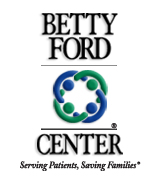Betty Ford Center: Difference between revisions
mNo edit summary |
|||
| Line 1: | Line 1: | ||
[[File:BFC logo.jpg|thumb]] |
[[File:BFC logo.jpg|thumb]] |
||
The '''Betty Ford Center''' (BFC), previously the '''Betty Ford Clinic''', is a |
The '''Betty Ford Center''' (BFC), previously the '''Betty Ford Clinic''', is a non-profit, separately licensed residential chemical dependency recovery hospital in [[Rancho Mirage, California]], that offers inpatient, outpatient, and day treatment for alcohol and other drug addictions as well as prevention and education programs for family and children. The Betty Ford Center, which is adjacent to [[Eisenhower Medical Center]], has 100 inpatient beds available on their campus and additional lodging for 84 clients in the Residential Day Treatment program. |
||
The Center was co-founded by former [[United States|U.S.]] [[First Lady of the United States|First Lady]] [[Betty Ford]] and [[Leonard Firestone]] in October, 1982. Mrs. Ford's decision to undertake such a project followed on the heels of her own battle with [[alcohol dependence]] and [[opioid]] [[analgesic]] [[Substance use disorder|addiction]],<ref name=abcnews>[http://abcnews.go.com/GMA/story?id=125672&page=1 Betty Ford Reflects on Center's 20 Years, ABC News]</ref> and after her release from the Long Beach Naval Hospital, she pursued the goal of creating a treatment center that emphasized the needs of women.<ref>[http://www.fordlibrarymuseum.gov/grf/bbfbiop.asp Biography]</ref> |
The Center was co-founded by former [[United States|U.S.]] [[First Lady of the United States|First Lady]] [[Betty Ford]] and [[Leonard Firestone]] in October, 1982. Mrs. Ford's decision to undertake such a project followed on the heels of her own battle with [[alcohol dependence]] and [[opioid]] [[analgesic]] [[Substance use disorder|addiction]],<ref name=abcnews>[http://abcnews.go.com/GMA/story?id=125672&page=1 Betty Ford Reflects on Center's 20 Years, ABC News]</ref> and after her release from the Long Beach Naval Hospital, she pursued the goal of creating a treatment center that emphasized the needs of women.<ref>[http://www.fordlibrarymuseum.gov/grf/bbfbiop.asp Biography]</ref> |
||
Revision as of 22:07, 1 August 2011

The Betty Ford Center (BFC), previously the Betty Ford Clinic, is a non-profit, separately licensed residential chemical dependency recovery hospital in Rancho Mirage, California, that offers inpatient, outpatient, and day treatment for alcohol and other drug addictions as well as prevention and education programs for family and children. The Betty Ford Center, which is adjacent to Eisenhower Medical Center, has 100 inpatient beds available on their campus and additional lodging for 84 clients in the Residential Day Treatment program.
The Center was co-founded by former U.S. First Lady Betty Ford and Leonard Firestone in October, 1982. Mrs. Ford's decision to undertake such a project followed on the heels of her own battle with alcohol dependence and opioid analgesic addiction,[1] and after her release from the Long Beach Naval Hospital, she pursued the goal of creating a treatment center that emphasized the needs of women.[2]
In September 2010, the Center introduced a pain management track. The program allows patients to gain insight into the ways in which pain has changed their ability to think and approach life.
BFC has a very active Alumni program with groups meeting on a regular basis across the United States and Canada.
The Betty Ford Center Foundation is a vital part of the life of the Center and raises money to support the mission of the Betty Ford Center through gifts, pledges and planned giving programs.
In 2006, the Betty Ford Institute was created. Its mission is to conduct and support collaborative programs of research, prevention, education and policy development that lead to a reduction of the devastating effects of substance use disorders on individuals, families and communities. In 2008, the BFI established the Children’s Program Training Academy with the goal of training and certifying service providers in cities around the country to offer Children’s Programs locally. In 2009 the Professionals in Residence Program (PIR) and the celebrated Summer Institute for Medical Students (SIMS) were realigned within the Betty Ford Institute. Both programs offer an incomparable learning opportunity about the Betty Ford Center. Mary Pattiz is currently the Betty Ford Center Chairman of the Board.
Programs
The center offers the following levels of care/programs:[3]
- Inpatient - detox and treatment - typically 30 days.
- Residential Day Treatment (RDT) - typically 30–60 days in off-campus housing, usually following inpatient treatment.
- Intensive Outpatient Program (IOP) - five evenings a week for 8 weeks.
- Clinical Diagnostic Evaluation (CDE) - A diagnostic assessment program for licensed healthcare professionals, attorneys, pilots and other individuals to determine whether or not they meet the DSM-IV criteria for "Substance Dependence".
- Family program - education on addiction as well as skills and tools for family members (age 13 and up) to begin their own healing process.
- Children's program - a 4-day program for children aged 7–12 with families suffering from addiction.
- The Young Adult Track (YAT) is designed to meet the unique treatment needs of young female and male adults ages 18–25, who are financially dependent upon their parents or other family members
References
External links
- Betty Ford Center - Official Website
- Treatment Programs and Prices
- Pain Management Track
- Betty Ford Institute
- Alumni Program
- Charitable Foundation page
- Children’s Program Training Academy
- Professionals in Residence Program
- Summer Institute for Medical Students
- "What is Binge Drinking?" Interview with Johanna O’Flaherty, Ph.D., Vice President of Treatment Services at Betty Ford Center
- "19 Most Frequently Asked Addiction Treatment Questions" by Dr. James West, retired Medical Director of the Betty Ford Center
- Addictive Substances Effects and Withdrawal Symptoms Informational Chart
